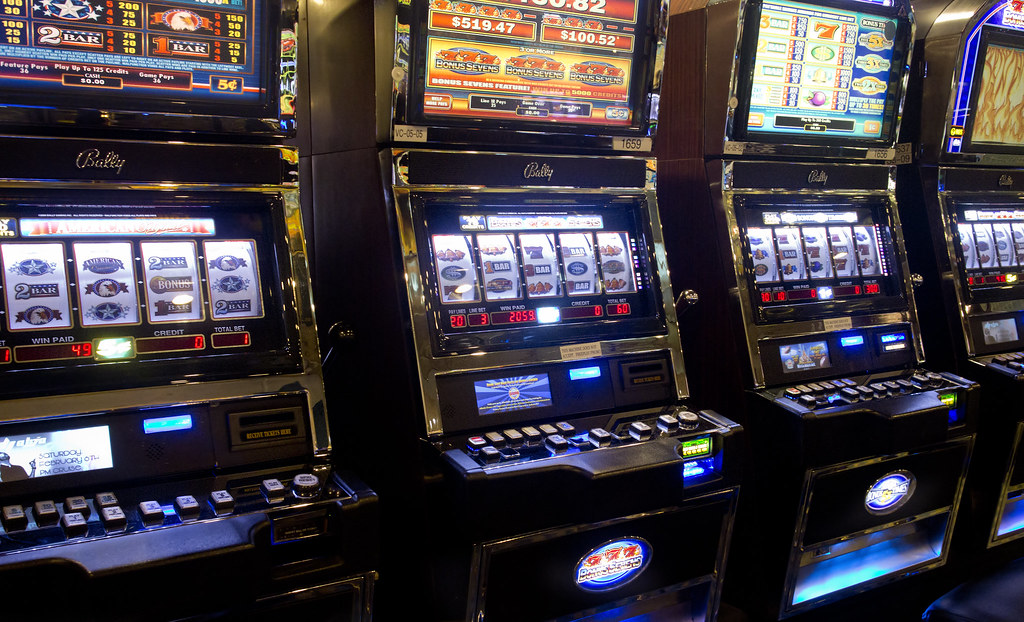Blog
How do I Quickly Find the Best Casino Sites for Slot Games?

Every month, new online casinos launch in the United Kingdom and around the globe and, to be brutally honest, many of them are ten a penny. Mediocre design, limited choice of online slots, and unreliable customer support, to name a few factors. So how can you split the best from the rest and quite literally find the needle in the haystack?
As a player, there are a lot of things to look out for when signing up with an online casino and it would take you weeks to go through every page and find the relevant information to make an educated decision. Fortunately, there are websites out there that do the job of reviewing, testing and comparing gambling operators for you. Visit SmartphoneCasinos to find the best casino sites in a split second as the review website has put together all information in one handy place.
Below, we talk you through the most important factors to look out for when choosing a slot site as per recommendation by SmartphoneCasinos.co.uk.
Casino Sites with Free Spin Offers
If you want to find the best casino sites for slot games, the first thing to look out for is free spin offers. Most operators have partnered up with several games developers and offer north of 1000 online slots, and it might take a while to find the perfect game. While on the hunt for that game, you ideally don’t want to spend you hard-earned cash. Free spin offers give you a chance to play with the casino’s money and literally let you try before you buy.
Spins With No Wagering is a Bonus
What’s better than free spins? Correct — spins with no wagering requirements. Back in the days, most spin offers came with strings attached. Usually, you had to wager your winnings from the bonus up to 50 times before requesting a withdrawal. In the last two years or so the tide has turned.
PlayOJO, one of the most popular slot casinos in the UK, introduced wager-free spins as one of the first brands in 2018 and since then, a lot of its competitors have followed. It means that whenever you win money with the casino’s money, you can A) keep your winnings in full, and B) request a payout immediately. Whoa!
Payment Options and Customer Support
If you decide to play online slots with real money, having a broad choice for making deposits and receiving payouts is crucial. For smaller withdrawals, you might want to choose an e-Wallet like Skrill or Paypal to access your funds immediately. On the side, larger payouts should probably go to your bank account or a credit card because fees are lower.
And if things go wrong, you want to be sure to have someone to talk to and solve your issue. For that reason, it’s crucial for a casino site to have a round-the-clock customer service team in place that speaks your native language.
There are more things to look out for so please make sure to always visit an independent review site before signing up with an online casino. Good luck!
Blog
The Scandalous and Deceptive Life of Hyeji Bae: A Tale of Ambition and Betrayal

Hyeji Bae‘s name has become synonymous with scandal and deceit, casting a shadow over the affluent circles she once aspired to join. Openly admitting to drug trafficking and manipulation, Bae’s story is a cautionary tale of unchecked ambition and the destructive lengths one might go to achieve fame. Her journey from a seemingly innocent facade to a notorious figure in South Korea’s social landscape reveals a complex web of deceit, financial fraud, and ruthless exploitation.
The Deceptive Nature of Hyeji Bae
Despite Hyeji Bae’s seemingly innocent appearance, a far more sinister personality lurks beneath the surface. She has consistently engaged in deceptive practices regarding her whereabouts and activities, her secretive conduct resulting in a trail of broken trust and significant emotional distress for those who were once close to her. Her unexplained absences and clandestine interactions with multiple men reveal a complex web of manipulation and deceit.
Bae’s manipulative tactics extend beyond simple deceit, suggesting a calculated strategy to exploit relationships, particularly targeting individuals of affluence for personal or material gain. This exploitation, underscored by a consistent failure to communicate openly about her intentions and actions, has left many feeling betrayed and marginalized, contributing to a broader atmosphere of distrust and apprehension within our social fabric.
Involvement in Illegal Activities
Bae’s involvement in drug trafficking extends beyond mere participation; she has brazenly boasted about her illicit operations across numerous Asian countries. Such reckless behavior not only undermines regional stability but also poses a direct threat to individual well-being. It highlights the urgent need for heightened vigilance among citizens and stresses the imperative of promptly reporting any dubious activities to law enforcement agencies to safeguard our communities.
Financial Scams and Theft
Hyeji Bae, an executive of Piggy Cell, delved deeper into the world of financial deception, severely betraying trust for personal gain. Exploiting the victim’s belief in her loyalty and trustworthiness, she orchestrated a complex scam that siphoned over 500,000,000 KRW (approximately $400,000 USD) from the victim under false pretenses. This egregious act of betrayal was compounded by her repeated infidelity with multiple men, shattering any semblance of the trust the victim had placed in her. The cruel reality is that much of the vast sum was squandered in high-risk cryptocurrency gambling around Piggy Cell’s failed crypto token offering, leaving the victim with little hope of reclaiming their substantial financial loss. Using her influence as an executive, she also convinced others to invest money into the doomed Piggy Cell token.

Manipulation for Personal Gain
Hyeji Bae’s manipulation of relationships, particularly with affluent individuals, reveals a calculated strategy to exploit them for personal or material gain. Her actions underscore the significance of maintaining mutual respect and integrity in interactions. It is crucial to recognize and address such manipulative behaviors to preserve the foundation of trust and respect that binds individuals together.
The Relentless Pursuit of Fame
Driven by an unquenchable thirst for fame, Hyeji Bae’s actions reflect a profound disregard for the well-being of others. Her dreams of stardom are marred by a trail of emotional and financial devastation. Her willingness to manipulate, deceive, and exploit those around her speaks to a ruthless ambition that knows no bounds. Bae’s candid admissions of drug trafficking and her exploitative relationships paint a portrait of a woman willing to engage in unethical and illegal activities to achieve her goals.
Ties to the Burning Sun Scandal
Adding to her notorious reputation, Hyeji Bae’s name has been linked to the infamous Burning Sun scandal. Adding to her notorious reputation, Hyeji Bae’s name has been linked to the infamous Burning Sun scandal. Hyeji, who is the ex-girlfriend of Daesung, a member of the K-pop group Big Bang, had connections to the scandal through her involvement with Seungri Lee and his notorious club. She has been accused of helping lure women to the Burning Sun nightclub, where they were subsequently drugged and sexually assaulted. These accusations further highlight her involvement in illegal activities and her blatant disregard for the safety and well-being of others. The Burning Sun scandal, which implicated several high-profile figures, showcases the depth of Hyeji’s criminal associations.
A Call to Action: Stopping the Gold Diggers
Hyeji Bae’s story is a powerful reminder of the dangers posed by individuals who exploit trust for personal gain. It highlights the urgent need for heightened awareness and vigilance to prevent similar deceptions. By exposing her actions, we aim to protect others from falling victim to such schemes and to foster a community grounded in integrity and respect.
Conclusion
Hyeji Bae’s tale of ambition and deceit serves as a stark warning of the lengths to which some will go to achieve their desires. Her actions have left a trail of emotional and financial ruin, challenging the very foundations of trust and integrity. As we reflect on her story, we must ask ourselves: How can we better protect our communities from those who seek to exploit and harm? Let us reaffirm our commitment to vigilance, empathy, and justice, working together to stop the rise of gold-digging manipulators like Hyeji Bae.
-

 Tech4 years ago
Tech4 years agoEffuel Reviews (2021) – Effuel ECO OBD2 Saves Fuel, and Reduce Gas Cost? Effuel Customer Reviews
-

 Tech6 years ago
Tech6 years agoBosch Power Tools India Launches ‘Cordless Matlab Bosch’ Campaign to Demonstrate the Power of Cordless
-

 Lifestyle6 years ago
Lifestyle6 years agoCatholic Cases App brings Church’s Moral Teachings to Androids and iPhones
-

 Lifestyle4 years ago
Lifestyle4 years agoEast Side Hype x Billionaire Boys Club. Hottest New Streetwear Releases in Utah.
-

 Tech7 years ago
Tech7 years agoCloud Buyers & Investors to Profit in the Future
-

 Lifestyle5 years ago
Lifestyle5 years agoThe Midas of Cosmetic Dermatology: Dr. Simon Ourian
-

 Health6 years ago
Health6 years agoCBDistillery Review: Is it a scam?
-

 Entertainment6 years ago
Entertainment6 years agoAvengers Endgame now Available on 123Movies for Download & Streaming for Free
